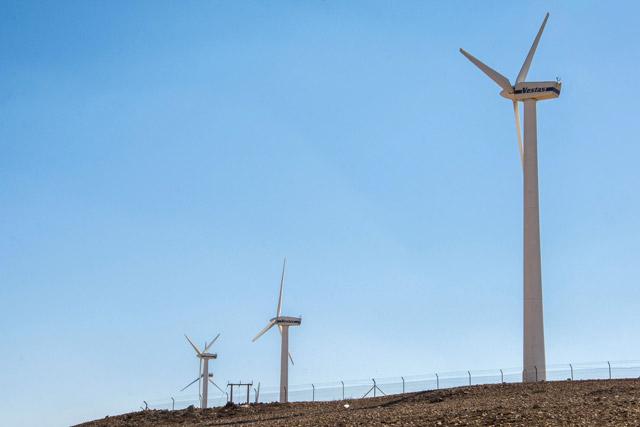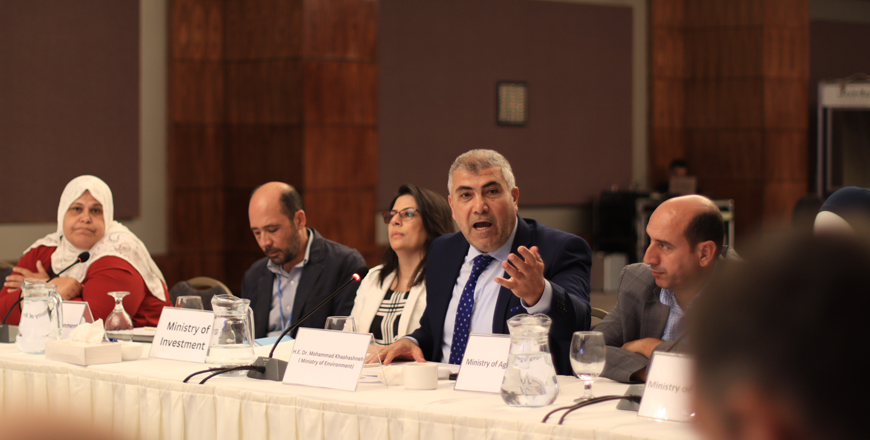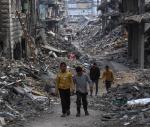You are here
Jordan hopes to ‘go green’ with National Green Growth Plan
By Hana Namrouqa - May 25,2017 - Last updated at May 25,2017

Jordan’s National Green Growth Plan aims to lead the country into a sustainable economy that creates more jobs and achieves social inclusion (Photo by Amjad Ghsoun)
AMMAN — The Ministry of Environment on Wednesday launched the National Green Growth Plan (NGGP) to guide green-growth projects and align relevant policies and investments with national development goals.
The NGGP lists 24 projects in six sectors where the potential for implementing green investments is feasible, and also addresses barriers facing the implementation of green projects in Jordan, according to officials.
An outcome of a two-year collaboration with over 100 national and international experts, the plan is aimed at leading Jordan into a sustainable economy that creates more jobs and achieves social inclusion, while also reducing negative environmental impacts.
The plan has identified water, energy, agriculture, waste management, transport and tourism as the six main sectors in which green economic projects are viable, according to the plan.
Minister of Environment Yaseen Khayyat considered the shift to a green economy as one of the “most important” tools to address the economic and environmental challenges faced by the Kingdom.
During the plan’s launch ceremony, Khayyat said that demand for water and energy, two of Jordan’s most limited resources, is increasing and is only exacerbating by the influx of Syrian refugees into the country.
He noted that the Syrian crisis continues to affect the Kingdom’s economy, environment and society as a whole, noting that, to this end, Jordan has adopted a “gradual and planned” transition towards sustainable growth, founded on a “wise and sustainable” use of natural resources and preservation of the environment.
Renewable energy projects feature in the plan, with a focus on the generation of electricity using wind and solar energy. They are designed to be funded through a variety of financing mechanisms from the public sector, the private sector, donor agencies and partnerships between the private and public sectors.
The NGGP was funded by the German federal environment ministry and implemented by the Ministry of Environment and the Global Green Growth Institute (GGGI).
GGGI Assistant Director General Per Bertilsson said that it is difficult to see poverty reduction taking place in a country without sustained economic growth, adding that it is also difficult to see countries grow rapidly if natural resources are overused, as it will eventually impact economic growth.
He indicated that several countries degraded their natural resources and then started rehabilitation, underscoring that it is more cost effective to protect natural resources from the beginning.
Green growth is closely linked to poverty reduction and countries around the globe are embarking on it, Bertilsson indicated.
“The Arab League has requested that the NGGP be shared with its 22 members, which is a great recognition for Jordan,” Bertilsson noted at the launch ceremony.
Green economy in Jordan was institutionalised in 2014, when the Cabinet approved the formation of a high-level national steering committee for green economy, and a unit for green economy was set up at the ministry, according to officials.
Related Articles
AMMAN — Preparations for the implementation of the National Green Growth Plan (NGGP) kicked off on Monday, with the aim of securing funds fo
The Environment Ministry and the Global Green Growth Institute (GGGI) on Thursday signed an agreement to prepare a plan to develop environmental projects in Jordan, achieve sustainable development and attract green investments.
AMMAN — The Kingdom’s target to reduce greenhouse gas emissions by 31 per cent by the year 2030 requires an estimated JD7.5 billion in inves

















